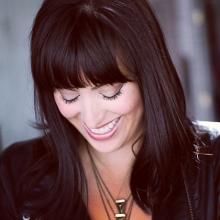Anna Lamadrid is a third-year MFA candidate in the Professional Actor Training Program. At UW, she originated the role of Rachel in Reading to Vegetables and got to sass it up as Aunt Sally in 5th of July. She'll next be seen in the world premiere of Cold Empty Terrible, a devised piece directed by guest artist Whit MacLaughlin and created in collaboration with UW School of Drama MFA students. In this blog post, Anna reflects on the process of creating Cold Empty Terrible and what that experience has brought to the surface for her as an artist.
As I begin my final year at the University of Washington, and the more we dive into Cold Empty Terrible rehearsals, I can’t help but reflect on my experiences in the School of Drama and what those experiences have taught me.
I chose to come to grad school because I had a specific set of skills that I needed to sharpen – goals that I needed to check off: range in voice, coordination, Shakespeare mastery (ha!), IPA, and dialect mastery. The list goes on and on. Needless to say, it made for a very nerve-wrecking first year. Because I thought I knew what that mastery was supposed to look like, there was A LOT at stake, which meant there was A LOT of fear present.
There are countless of inspiring art quotes about “the unknown” – the fear of it and how we use it as artists. Here is one of my favorites:
“The artist never entirely knows. We guess. We may be wrong, but we take leap after leap in the dark.” ~Agnes de Mille
It is difficult for us as students to fully dive deep into the “unknown” because our goals coming into a program seems to be all about “knowing.” Despite the constant encouragement from our professors to let go and “live with the questions” we continue stubbornly to try to answer them all, to know it and get it right. I mean, why would I get into all this debt and not have ANY of the answers!? Am I right?!
It is almost impossible to feel comfortable with the “unknown” when you have a vision of what something is supposed to look like. With most of our coursework, we can easily be seduced into checking off that mastery box for all of our classes. At the end of the day, I know that there will be a Linklater progression that I can “master.” With Suzuki, I know that there are positions and marches that I need to “get right.” Even with studio, there is a certain character arc (prescribed by the script) that I need to bring to life in order to tell the story. We focus on the certainty of the black and whites, when art lives in the complexity of the grays.
We focus on the certainty of the black and whites, when art lives in the complexity of the grays.
When there is a desired target, the process can become a burden – something I have to get through in order to get what I want. Nowadays, we are kind of wired that way. Everyone expects a polished product at the end...something they can sell. That kind of mindset is detrimental for an artist. We lose sight of why we came to the art form in the first place.
The rehearsal process with Whit, for me, has been about getting back to the art form. With no script, we get to come into rehearsal each time with a question. Something that we are curious about. Something about humanity that we want to illuminate. After each etude we get time to ruminate on what was learned from that exploration. We refine. We experiment. We make mistakes. We add things. We let things go. We change our minds. There is something very freeing about not knowing where all of this is heading. I have been able to finally do something that I think my professors have been ushering me to do for the last two years – resign myself to the process.
Everyone expects a polished product at the end...something they can sell. That kind of mindset is detrimental for an artist. We lose sight of why we came to the art form in the first place.
For me, releasing the anxiety of being "in process" and “not knowing” is the biggest unexpected lesson that I have learned in grad school, probably because it was never a goal. I wouldn’t even have realized that I was living in a “prison of perfection” striving to make art “the right way” until I gave myself the time to fail...and fail...and fail.
As the "unknown" of beginning my life after grad school begins to rear its head, I can look back at this rehearsal process and say that just like Cold Empty Terrible...I have no idea what’s coming next...my life is “in process”...and I will continue to make art one way or another. With that, I will leave you with another quote:
“As my artist’s statement explains, my work is utterly incomprehensible and is therefore full of deep significance.” ~Calvin and Hobbes
Keep creating.

